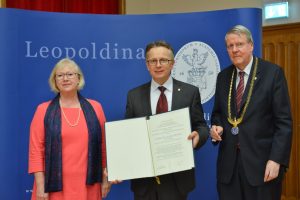Simulated Universes
Volker Springel elected to the German Academy of Sciences “Leopoldina”. Presentation of the membership certificate in Halle, Germany

Volker Springel, head of the Theoretical Astrophysics group at the Heidelberg Institute for Theoretical Studies (HITS), has been elected to the German Academy of Sciences Leopoldina. He received his his membership certificate at the official inauguration ceremony last week.
The astrophysicist Prof. Volker Springel has designed and carried out the largest and most comprehensive computer simulations of the universe. He developed the “Arepo” software which enabled scientists to simulate a wide range of galaxy shapes and sizes with supercomputers. Volker Springel has been leader of the “Theoretical Astrophysics” research group at HITS since 2010, and is a professor of Theoretical Astrophysics at Heidelberg University.
Founded in 1652, the Leopoldina is one of the oldest academies of science in the world. It is dedicated to the advancement of science for the benefit of humankind and to the goal of shaping a better future. With some 1,500 members, the Leopoldina brings together outstanding scientists from Germany, Austria, Switzerland and many other countries.
About HITS
HITS, the Heidelberg Institute for Theoretical Studies, was established in 2010 by physicist and SAP co-founder Klaus Tschira (1940-2015) and the Klaus Tschira Foundation as a private, non-profit research institute. HITS conducts basic research in the natural, mathematical, and computer sciences. Major research directions include complex simulations across scales, making sense of data, and enabling science via computational research. Application areas range from molecular biology to astrophysics. An essential characteristic of the Institute is interdisciplinarity, implemented in numerous cross-group and cross-disciplinary projects. The base funding of HITS is provided by the Klaus Tschira Foundation.